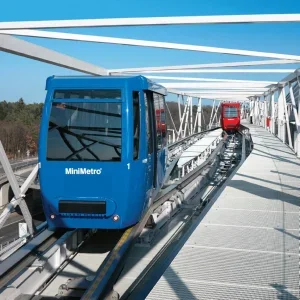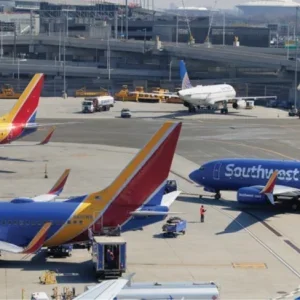The attackers arrived at the airport in a taxi. One waited outside the main terminal, while the other two, each carrying holdalls, attempted to make their way past a set of luggage scanners close to the main entrance. After being confronted by airport security, each man pulled an assault rifle from his bag and began indiscriminately shooting passengers and staff. Police on the scene returned fire, whereupon the assailants attempted to detonate the bombs in their backpacks. One was shot before he could trigger his device next to a crowd of people. CCTV footage from the night of the attack shows a police officer walk up to the stricken attacker, then quickly running away having noticed that the device he is holding is primed to explode.
The slaughter at Istanbul Atatürk Airport on 28 June 2016, which left 41 dead and at least 239 injured, was carried out by foreign nationals from Russia, Uzbekistan and Kyrgyzstan under the authority of so-called Islamic State. It’s a night that many are still coming to terms with, including staff at TAV Airports Holding, the operators of the airport. “We’re still mourning our losses,” says Mustafa Sani Sener, the firm’s CEO. “Among them were 11 TAV employees.”
Since the attacks, the company has worked hard to tighten security around the facility. This isn’t to say that TAV hadn’t taken extensive precautions prior to last year’s outrage. “Over the course of decades, the aviation industry has developed complex global security standards,” explains Sener. “As well as complying with these standards at the highest level possible, Turkish airports had additional security measures, including X-ray and security screenings, at the entrance of terminal buildings.”
Early intervention
One of the reasons the three attackers did not penetrate further into the airport was because they were confronted at this first security checkpoint. “Without these measures, the attackers would have taken a heavier toll on innocent life,” says Sener. “They struggled to enter the terminal building and security forces were able to counter the terrorists earlier.”
Would-be attackers now have to contend with an expanded security perimeter intended to push the opening moments of an assault even further from the core terminal site. In the weeks following 28 June, TAV armed its security staff with automatic weapons, raised the number of patrols they conducted around the airport, and prevented anyone from being dropped off directly at the terminal. All visitors must pass through a total of six security checkpoints before they reach the gate area. Concrete barriers have also been thrown up alongside roads to the airport to dissuade any potential truck or lorry bombers. “The security perimeter has been expanded,” adds Sener. “Now, any vehicles entering the airport are screened exhaustively.”
In their own way, these measures attempt to counter the current perception of the airport as a target in the eyes of the modern terrorist. Since 9/11, commercial airliners have largely ceased to be considered ‘soft’ targets for terrorist groups. Apart from a few high-profile cases – that of the ‘Shoe Bomber’ Richard Reid, or the downing of MetroJet Flight 9268 in the Sinai in an attack claimed by so-called Islamic State – bombs and guns and knives have usually been discovered by border control officers operating X-ray scanners, or attackers prevented from reaching the airport altogether by police and other state security organisations. Until very recently, that only left the airport entrance as a feasible area to attack. As passengers quietly pushed around their luggage on metal trolleys and queued behind check-in desks, this area was considered to be just another confined space in which to wreak sudden carnage.
The measures undertaken by TAV at Istanbul Atatürk are aimed at deterring another attack, or at the very least reducing the capacity of terrorists to cause the same level of mayhem. Nevertheless, Sener is unsure that any revised security measure would totally eliminate the threat against airports in general. “With the advent of globalisation, airports have evolved into spaces of social interaction,” he notes. “They serve as key infrastructure, benefitting a number of industries including tourism and trade. Therefore, they have a strategic importance in the functioning of modern societies and these quantities make them a target for terrorists, who aim at disrupting our daily lives through fear and intimidation.”
Computer trouble
There is a school of thought in security circles that such measures, while they have proved successful in preventing bomb and gun attacks at airports and aboard passenger planes, are less useful in tacking a more insidious threat. In March, the US and UK announced that they would restrict the number and type of electronic devices that passengers could carry on board flights from destinations across the Middle East and North Africa, including mobiles, laptops and tablet computers. Both countries said that they were acting on a credible threat that Islamic extremists, reportedly from al-Qaeda in the Arabian Peninsula (AQAP), were close to perfecting bombs that could be hidden within these machines.
The new measures were not entirely unprecedented – in 2006, multiple countries banned passengers from carrying on any liquids beyond medicines or baby formula almost overnight in response to another specific threat – but the news immediately attracted criticism. “The restrictions make no sense,” said Greeley Koch, the executive director of the Association of Corporate Travel Executives, to Flight Chic. “Assuming there is new terrorist technology, there is nothing to stop someone from carry[ing] one of these devices to Amsterdam, and then boarding a flight to the US or UK.”
The new rulings have proved to be a particular irritant for airlines across the region, and for the 60 million travellers that pass through the airport each year. The measures have been broadly criticised by the Turkish press and by the country’s transport minister, Ahmet Arslan, who announced that his department had sent a letter to US authorities decrying the restrictions and reaffirming Turkey’s commitment to thwarting terror-related activities within its borders.
“[We] stressed that terror activities and terrorists are present in every corner of the world, and the fight against them should be performed synchronically and in coordination in all parts of the world,” he said. “This practice is neither fair for our country nor for the US.”
It is a view that Sener broadly shares. “I believe that the measures enacted by the US authorities are largely motivated by commercial purposes,” he explains. “It’s an attempt to impede the growth of Turkish Airlines and other companies operating in the Gulf region. Consequently, I brought [up] the issue at the ACI Governing Board meeting in April.” The organisation represents more than 1,900 airports across the globe. The resulting discussion had by its members resulted in the ACI calling for urgent consideration of alternatives to the new Anglo-American restrictions.
“In the short term, these might include additional explosive-detection capability deployed at boarding gates, and/or the use of state-of-the-art technology for cabin baggage screening,” adds Sener.
Istanbul Atatürk is currently on the cusp of implementing these measures: “Two highly-sensitive tomography units capable of detecting any explosive threat will be in place by the end of May,” confirms Sener.
Constant vigilance
TAV’s chief executive is confident that, once these measures are put in place, the Anglo-American ban on electronic devices will eventually be lifted. “As the ACI board has noted, inconsistency in the application of security measures does not lead to security effectiveness, and may result in simply moving the threat to other locations, rather than addressing it,” explains Sener (at the time of writing, sources in the US Department of Homeland Security indicated that the ban may be extended to additional countries in Europe). “ In the present case, it also leads to passenger confusion and results in commercial distortions not just for airlines, but also for airports.”
Perhaps what TAV and the authorities in the US and UK can agree on is the necessity of constant vigilance against the threat of terrorist acts in airports. Organisations like so-called Islamic State and al-Qaeda will always seek to commit atrocities in frequently visited areas that have only a modicum of security. That demands a daily and substantial effort on the part of law enforcement to disrupt the planning and coordination of terrorist cells.
The problem also begs a more longterm approach, according to Sener, one that attacks the problem root and branch. “Today, terrorism is a global threat affecting people and economies around the world indiscriminately,” he says. “I believe that, without eradicating the root causes of terrorism, we may minimise the impact, but it’s very hard to eradicate the threat altogether.”






